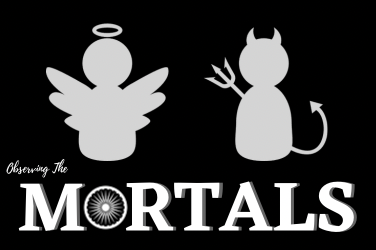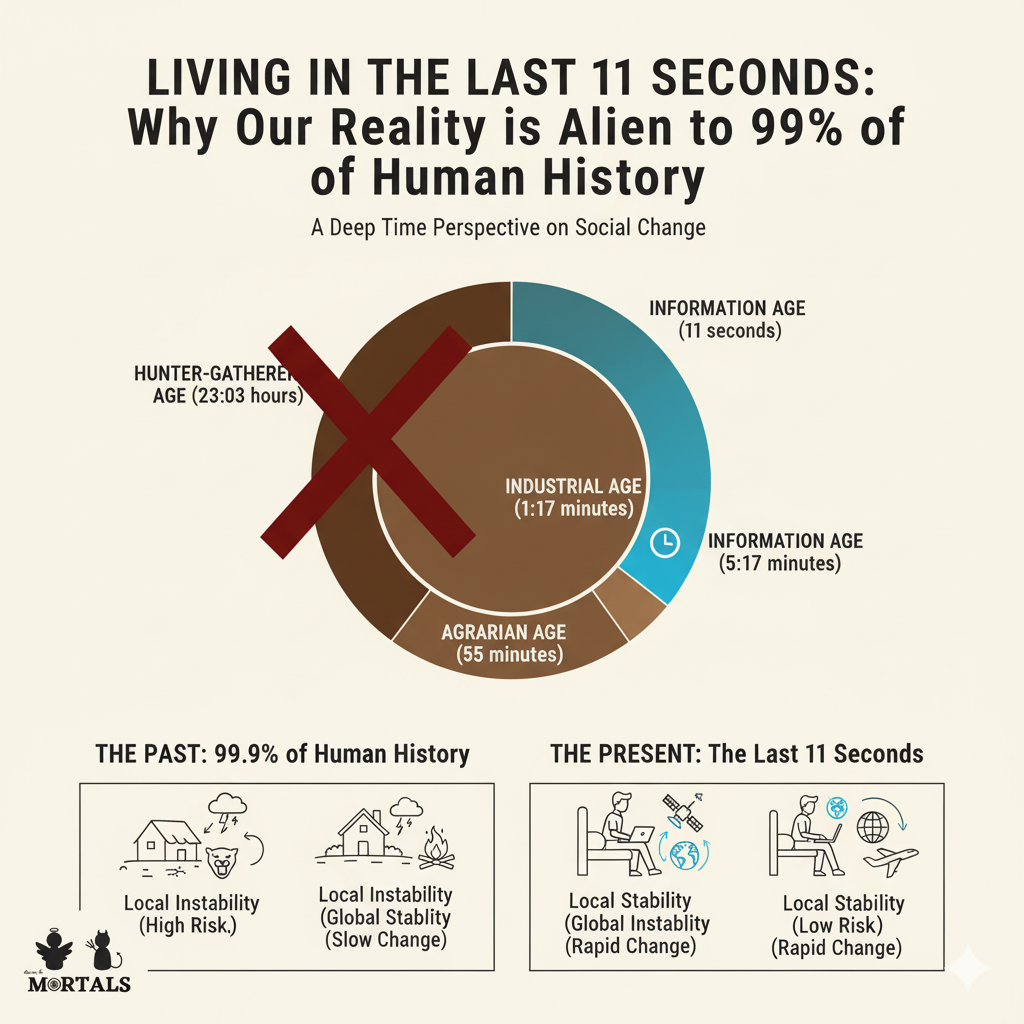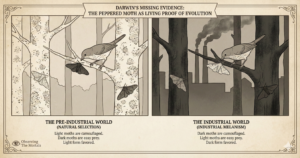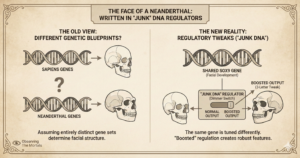You wake up in a safe bed, take a hot shower, make an instant coffee, and check your smartphone. These are some of the most banal and routine acts of modern life. But what if these simple acts make you one of the “weirdest” and most historically anomalous humans who has ever lived? In a powerful essay, political scientist Brian Klaas uses the vast timeline of our species to argue just that. By condensing the entire history of Homo sapiens into a single day, he shows that our current “Information Age” is merely the last 11 seconds. This case study explores his argument that our lived experience is not a continuation of the past, but a radical and disorienting break from everything that came before.
The Information Box
Syllabus Connection:
- Paper 1: Chapter 8 (Social Change: Theories and Factors), Chapter 1.7 (Digital Anthropology), Chapter 1.4 (Human Evolution – Deep Time Perspective)
- Paper 2: Chapter 8 (Social Change in India: Impact of Modernity & Globalization)
- GS-1 & Essay: Globalization, Social Change, Modernity, Impact of Technology
Key Concepts/Tags:
- Social Change, Modernity, Globalization, Digital Anthropology, Local vs. Global Instability, Many-to-Many Communication
The Setting: Who, What, Where?
This case study is based on the essay “We are different from all other humans in history” by author and political scientist Brian Klaas. It is not a traditional ethnography of a single place, but a sweeping analysis of the contemporary human condition. It contrasts the lived experience of people alive today—in a world of jet travel, the internet, and globalized culture—with the experience of the roughly 9,500 generations of our Homo sapiens ancestors who lived as hunter-gatherers, farmers, and early industrial subjects.
The Core Argument: Why This Study Matters
This is a powerful synthesis that uses a deep-time anthropological perspective to make modern life feel strange, new, and historically unprecedented.
- The “11-Second” Reality: The essay’s most powerful metaphor is condensing the ~257,000-year history of our species into a 24-hour day. In this scale:
- The Hunter-Gatherer Age lasts 23 hours and 3 minutes.
- The Agrarian Age lasts 55 minutes.
- The Industrial Age lasts just 1 minute and 17 seconds.
- The Information Age, which defines our lives, is a mere 11 seconds. The core argument is that we are natives of this tiny, bizarre slice of time, and our reality is fundamentally alien to the 99.9% of human experience that came before.
- The Great Inversion of Stability: This is a key analytical insight. The author argues that we have completely inverted the historical human experience of stability and risk:
- The Past = Local Instability + Global Stability: For our ancestors, daily life was incredibly precarious (famine, disease, violence were constant threats), but the overall structure of society and the world changed very little from one generation to the next.
- The Present = Local Stability + Global Instability: Our daily lives are hyper-predictable and routine, giving us an “illusion of control.” But the macro-framework of our world (technology, climate, geopolitics) is in a state of constant, radical flux.
- Fundamental Rewiring of Social Life: The essay details several unprecedented shifts that have rewired our consciousness and social structures, including:
- Global Consciousness: The ability to see our own planet from space (the “Earthrise” effect), creating an understanding of fragility and unity impossible for all prior generations.
- “Many-to-Many” Communication: The internet has destroyed the old “few-to-many” model of information, where elite gatekeepers controlled the narrative. Now, everyone is a potential creator and disseminator, leading to both democratization and chaos.
- Globalized Social Comparison: Social media has shifted our “reference category”—the group we compare ourselves to—from a small, local community to a global population of billions, with profound psychological consequences.
The Anthropologist’s Gaze: A Critical Perspective
- Whose “We”? The Problem of a Homogenized Modernity: A critical anthropological question would be: who is the “we” being described in this essay? The author brilliantly captures the experience of a globalized, technologically saturated individual. However, is this experience universal? The essay acknowledges “lifestyle divergence,” but the overall narrative centers on a specific type of modernity. The daily reality of a subsistence farmer in rural Africa or a hunter-gatherer in Papua New Guinea today might still have more in common with the “local instability” of the past than with the author’s world of jet lag and CRISPR.
- Continuity within the Discontinuity: While the essay masterfully highlights the radical breaks with the past, an anthropologist would also search for the deep continuities in human behavior. Do our modern social media “tribes” not operate on the same ancient principles of in-group solidarity and out-group hostility? Does our modern anxiety in the face of “global instability” not tap into the same evolutionary survival mechanisms as our ancestors’ fear of a predator? The essay focuses on the what of our experience; anthropology also asks if the deep how of our social instincts has changed at all.
- The Ambivalence of “Progress”: The essay expresses a sense of wonder at modern comforts, but also anxiety about its consequences (polarization, disconnection from nature). A post-development theorist, like Arturo Escobar, might offer a sharper critique, arguing that this “11 seconds” of progress for a minority of the world’s population has come at a catastrophic ecological and social cost for the planet and for the majority who do not fully share in its benefits.
The Exam Angle: How to Use This in Your Mains Answer
- Types of Questions Where It can be Used:
- “The pace and nature of social change in the contemporary era are unprecedented. Discuss.”
- “Analyze the impact of globalization and digital technology on modern society.”
- This is prime material for the Essay paper, on topics of modernity, progress, technology, or the human condition.
- Model Integration:
- On Social Change: “The pace of social change in the contemporary era is historically unprecedented. As thinkers like Brian Klaas have argued, if human history were a 24-hour day, our ‘Information Age’ would be merely the last 11 seconds, indicating a radical experiential break from all previous human generations.”
- On Globalization/Technology (GS-1/Essay): “Globalization and technology have inverted the human experience of stability. In the past, life was characterized by ‘local instability’ but ‘global stability’ (generational continuity). Today, as Brian Klaas notes, we experience extreme ‘local stability’ in our routines amidst profound ‘global instability’ (rapid technological and ecological change).”
- To provide a powerful example: “The shift from ‘few-to-many’ to ‘many-to-many’ communication, enabled by the internet, is a key driver of modern political polarization. This is a historically unique situation, as for over 99% of human history, information was either local or controlled by elite gatekeepers.”
Observer’s Take
Brian Klaas’s essay is a powerful dose of perspective, using the vast timeline of anthropology to make our mundane, everyday lives seem utterly alien and extraordinary. It is a compelling call to recognize our own historical “weirdness.” The feeling of jet lag, the photo of Earth from space, the act of a child teaching a parent how to use a phone—these are not trivial details; they are markers of a profound rupture in the human story. The essay is a crucial reminder that we are all living in a fast, exhilarating, and often frightening global experiment, navigating a world for which our deep evolutionary past has not fully prepared us. Acknowledging this strangeness is the first step to wisely navigating the thrilling and perilous “11 seconds” we call the present.
Source
- Title: We are different from all other humans in history
- Author: Brian Klaas
- Publication: The Garden of Forking Paths (Substack)





